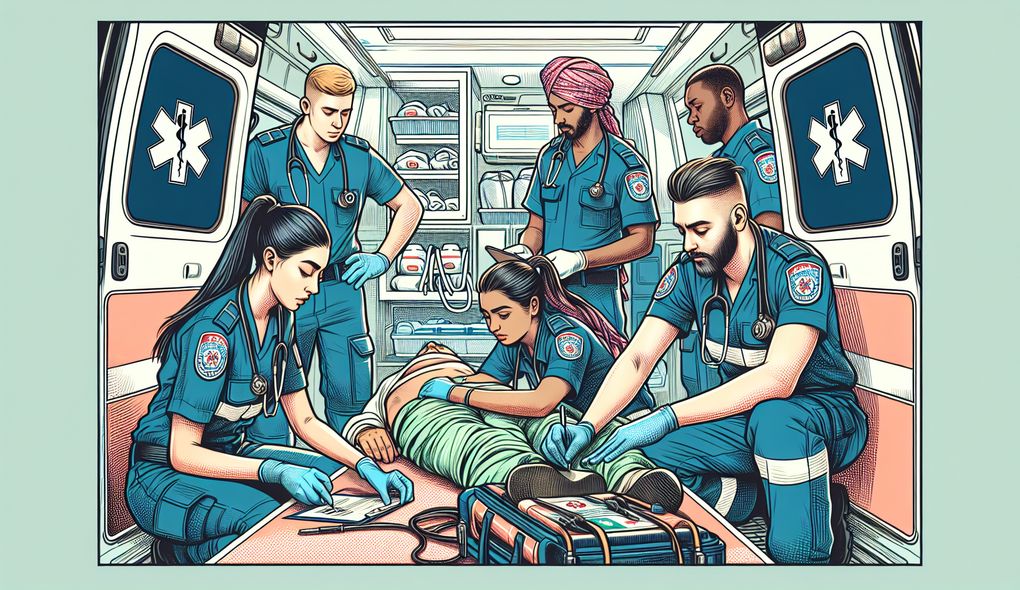How do you handle working with critically ill and injured patients?
INTERMEDIATE LEVEL

Sample answer to the question:
When working with critically ill and injured patients, I always prioritize their safety and well-being. I start by assessing the patient's condition and performing necessary medical procedures, such as CPR or wound treatment. Communication is crucial, so I keep the patient informed about their condition and treatment plan. I also collaborate with other healthcare professionals to coordinate the best possible care for the patient. Additionally, I maintain accurate medical documentation and engage in continuous training to stay updated with the latest practices in emergency medicine.
Here is a more solid answer:
As a Paramedic with extensive experience in pre-hospital emergency care, I have developed a solid approach to working with critically ill and injured patients. When responding to emergency calls, I quickly assess the patient's condition using my excellent clinical skills. In high-pressure situations, I rely on my strong decision-making and problem-solving abilities to provide immediate care and make critical treatment decisions. Effective communication is essential, and I ensure that I keep the patient and their loved ones informed about their condition and the procedures being performed. Collaborating with other healthcare professionals is crucial, and I work closely with them to ensure coordinated and comprehensive care. My in-depth knowledge of medical procedures, medications, and protocols allows me to perform necessary procedures and administer medications accurately. Additionally, I am proficient in operating medical equipment, such as defibrillators and oxygen delivery devices, to provide the best possible treatment for the patient.
Why is this a more solid answer?
The solid answer expands on the basic answer by providing specific examples and details that showcase the candidate's experience and expertise in each evaluation area. However, it can be further improved by including more specific achievements or challenging cases that demonstrate the candidate's exceptional skills.
An example of a exceptional answer:
Working with critically ill and injured patients is a challenging yet rewarding aspect of being a Paramedic, and I have honed my skills and approach over the years to provide exceptional care. When faced with a critically ill or injured patient, I prioritize their immediate safety and well-being. Drawing on my extensive clinical experience and knowledge, I rapidly assess the patient's condition, making swift and accurate decisions to initiate life-saving interventions. For example, in a recent case, I encountered a patient in cardiac arrest. I performed high-quality CPR, effectively utilized an automated external defibrillator to restore the patient's heartbeat, and coordinated with the receiving hospital to ensure seamless transfer for advanced cardiac care. Clear and compassionate communication is paramount, and I ensure that I provide appropriate explanations to the patient and their loved ones while instilling confidence and offering emotional support. In complex cases, I collaborate closely with other healthcare professionals, seamlessly integrating our efforts and leveraging our collective skills to achieve the best outcome for the patient. I continually expand my medical knowledge through ongoing education and training, staying abreast of the latest advancements in emergency medicine. My proficiency with medical equipment, from monitoring devices to life support systems, allows me to deliver optimal care. Overall, I approach working with critically ill and injured patients with a combination of expertise, compassion, and adaptability, striving to provide them with the highest level of care during their most vulnerable moments.
Why is this an exceptional answer?
The exceptional answer goes above and beyond by providing specific examples of the candidate's achievements and exceptional skills in each evaluation area. The use of a challenging case in the cardiac arrest scenario demonstrates the candidate's ability to handle complex situations. The answer also highlights the candidate's continuous learning and adaptability, which are important qualities for working with critically ill and injured patients.
How to prepare for this question:
- 1. Familiarize yourself with the latest medical procedures, protocols, and medications related to emergency medical services
- 2. Seek opportunities to work in high-pressure environments, such as volunteering for ambulance ride-alongs or joining a trauma team
- 3. Practice effective communication and interpersonal skills, including delivering difficult news and offering emotional support
- 4. Gain hands-on experience with medical equipment commonly used in pre-hospital emergency care
- 5. Stay updated with the latest advancements in emergency medicine through continuous education and training
What are interviewers evaluating with this question?
- Clinical skills
- Decision-making and problem-solving
- Ability to work under pressure
- Communication and interpersonal skills
- Medical knowledge
- Proficiency with medical equipment

